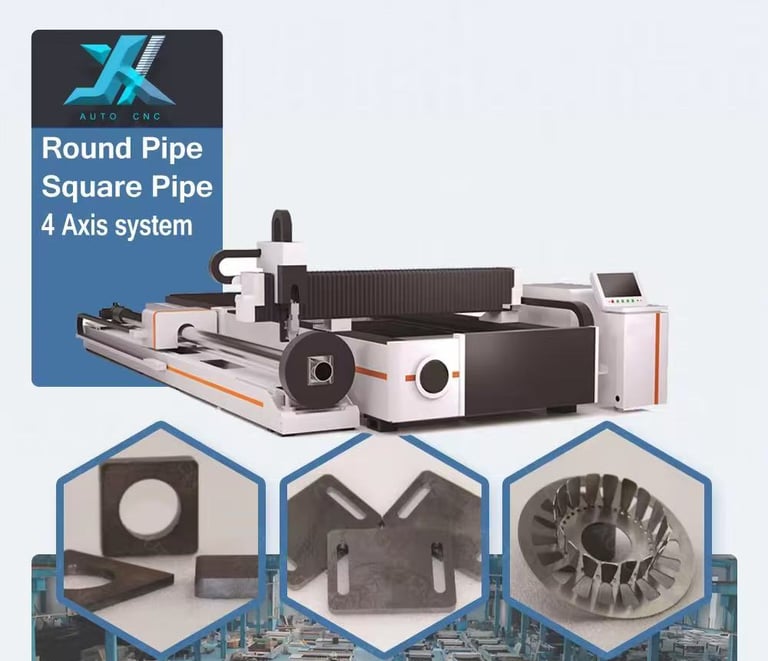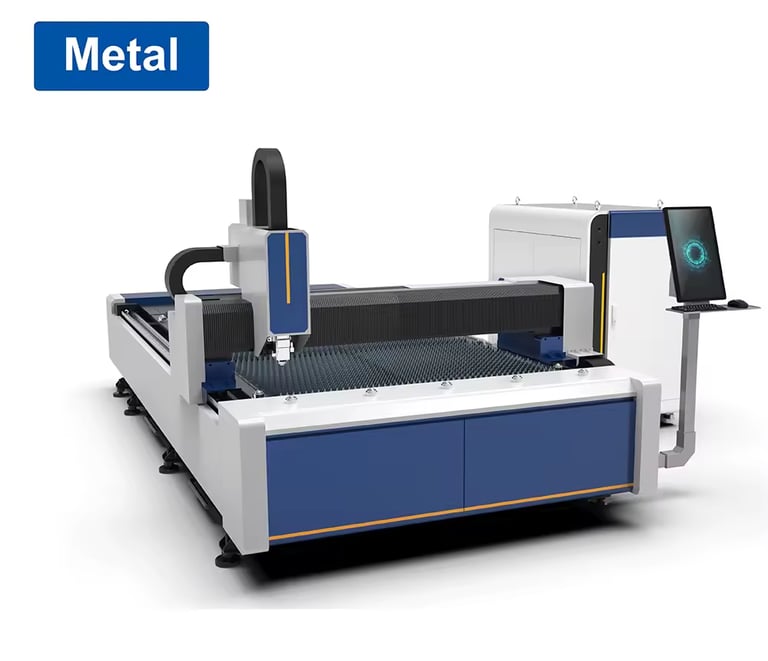The Ultimate Guide to CNC and Laser Cutting Machines: Choosing the Right Tool for Your Needs
LEON MACHINERY
3/4/20254 min read


In the world of precision cutting and engraving, CNC and laser machines have revolutionized industries ranging from metal fabrication to woodworking, signage, and even jewelry making. Whether you are an industrial manufacturer or a small business owner, understanding the different types of CNC and laser cutters is crucial for making the right investment.
This guide explores various CNC and laser cutting technologies, including CNC metal cutters, fiber and CO2 laser machines, plasma cutters, CNC routers, and more. By the end of this article, you will have a solid grasp of the best machine for your business.
CNC Metal Cutter: Precision and Power
A CNC metal cutter is an automated machine designed to cut metal sheets, tubes, and components with extreme precision. It is used in industries such as aerospace, automotive, and heavy machinery manufacturing. CNC metal cutters include plasma cutters, fiber cutters, and laser cutters, each with unique advantages.
Benefits of CNC Metal Cutters
High precision and repeatability
Capable of cutting various metal types, including steel, aluminum, and titanium
Reduced material wastage due to efficient cutting paths
Ideal for mass production and custom fabrication
CO2 Laser Cutter vs. Mix CO2 Cutter
CO2 Laser Cutter
A CO2 laser cutter is one of the most popular laser cutting machines. It uses a gas mixture, primarily CO2, to produce a high-powered laser beam that can cut, engrave, and etch various materials, including wood, acrylic, leather, and metal (with limitations).
Pros:
✔️ Excellent for non-metal materials
✔️ High-speed cutting
✔️ Fine engraving capability
Cons:
❌ Not suitable for cutting reflective metals without an auxiliary gas
❌ Higher maintenance compared to fiber lasers
Mix CO2 Cutter
A Mix CO2 cutter is an upgraded version of the CO2 laser cutter, designed to handle both non-metals and thin metals. By integrating special gases and higher wattage, it can cut thin sheets of stainless steel and other metals while retaining the flexibility of a traditional CO2 cutter.
Plasma Cutter: Ideal for Thick Metal Cutting
A plasma cutter uses an electrically conductive gas to create a high-temperature plasma arc that slices through metals quickly. It is widely used in industrial manufacturing, automotive repair, and metal fabrication shops.
Advantages of Plasma Cutting
Cuts through thick metal sheets effortlessly
Faster than traditional mechanical cutting methods
Works well with conductive metals like steel and aluminum
Disadvantages
Less precise than laser or waterjet cutting
Produces more heat-affected zones
Requires proper ventilation due to fume generation
Fiber Cutter: The Future of Metal Cutting
A fiber cutter is a type of laser cutter that uses a fiber-optic laser source. It is particularly efficient for cutting metals, including stainless steel, aluminum, brass, and copper.
Why Choose a Fiber Cutter?
✅ Superior energy efficiency compared to CO2 lasers
✅ Faster cutting speeds on thin metals
✅ Low maintenance with long-lasting laser diodes
✅ Suitable for high-precision industrial applications
Fiber laser cutters are the industry standard for metal fabrication, offering exceptional precision and speed.
Two-in-One Metal Cutter: Versatility at Its Best
A two-in-one metal cutter combines different cutting technologies, such as plasma and laser, into a single machine. This allows users to switch between cutting methods depending on the material and required precision.
Key Features:
Dual-functionality saves space and investment costs
Flexible for various material types
Enhances efficiency for industrial applications
Laser CNC: The Ultimate Precision Tool
A laser CNC machine integrates laser technology with CNC automation, enabling highly precise cutting and engraving. It is used in metalworking, jewelry making, and electronic circuit board fabrication.
Applications of Laser CNC Machines
Fine engraving on metals and plastics
Cutting intricate patterns for artistic applications
High-speed production for industrial parts
CO2 Laser Marker & Fiber/UV Laser Marker
Laser marking is a non-contact process used to engrave or mark surfaces with high precision.
CO2 Laser Marker
🔹 Best for wood, plastic, leather, and glass
🔹 Creates deep, high-contrast markings
Fiber/UV Laser Marker
🔹 Ideal for metals, electronics, and delicate materials
🔹 UV laser markers are excellent for sensitive surfaces like medical devices
Laser Cleaner: A Revolutionary Cleaning Solution
A laser cleaner removes rust, paint, and contaminants from metal surfaces using high-intensity laser pulses. It is an eco-friendly and non-abrasive method compared to traditional sandblasting.
Industries that Benefit from Laser Cleaning:
Aerospace and automotive restoration
Heritage and antique preservation
Industrial machinery maintenance
Laser Welder: Precision Welding at Its Finest
A laser welder is used for high-precision metal joining applications, especially in the automotive, medical, and electronics industries.
Benefits of Laser Welding
✔️ Produces strong, high-quality welds
✔️ Minimal heat-affected zones
✔️ Ideal for thin metal sheets and delicate components
CNC Routers: Versatile Cutting for Various Materials
A CNC router is a computer-controlled cutting machine designed for wood, plastic, metal, and composites.
Types of CNC Routers
3/4/5 Axis CNC Router – Increased flexibility for complex designs
ATC CNC Router – Automated tool changes for efficiency
Combined Router – Handles multiple materials in one machine
Metal Milling Router – Specialized for metal engraving and cutting
Multi-Spindle Head CNC – Increases productivity by working on multiple pieces simultaneously
Stone Router – Used for carving and engraving stone surfaces
Hobby CNC – Affordable option for DIY enthusiasts
Digital CNC & 3D CNC: The Next Generation of CNC
A digital CNC integrates smart technology for precise automated cutting, while a 3D CNC machine can create three-dimensional objects by milling away material layer by layer.
Popular Uses:
3D sculptures and prototypes
Complex industrial part manufacturing
Custom signage and engraving
LED Advertising CNC Machine: Bringing Creativity to Life
LED advertising CNC machines specialize in cutting and engraving acrylic, PVC, and aluminum for illuminated signboards and display panels. They help businesses create stunning visual advertisements.
Choosing the Right CNC or Laser Machine for Your Business
When selecting a cutting or engraving machine, consider the following factors:
Material Type – Metals require fiber lasers or plasma cutters, while wood and acrylic are better suited for CO2 lasers or CNC routers.
Precision Needs – Fiber lasers offer superior accuracy, whereas plasma cutters excel in speed.
Budget – CNC routers and CO2 lasers are more affordable, while fiber lasers and plasma cutters are higher investments.
Production Volume – High-speed automation is essential for mass production.
Conclusion
CNC and laser cutting technologies have transformed industries by enhancing efficiency, precision, and design flexibility. Whether you need a CNC metal cutter, fiber laser, plasma cutter, or multi-axis CNC router, choosing the right machine depends on your business’s specific needs.
By understanding each type’s capabilities and benefits, you can make an informed investment that maximizes productivity and profitability.
Which machine suits your business best? Let us know your requirements, and we’ll help you find the perfect solution!


